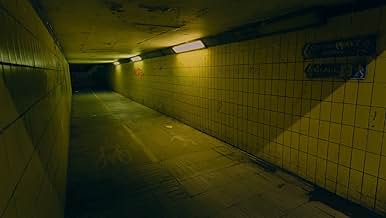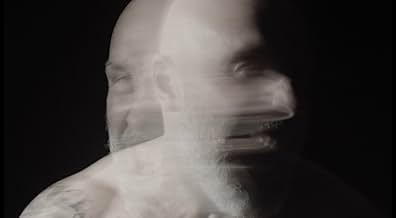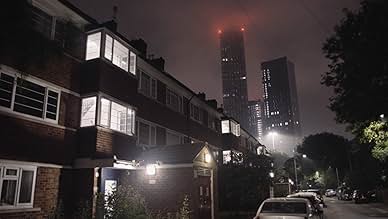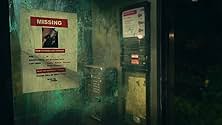This multi award-winning British feature film follows a grieving ex-English teacher as he takes us on a personal journey through Broken Britain under Margaret Thatcher in the 1980s, John Maj... Read allThis multi award-winning British feature film follows a grieving ex-English teacher as he takes us on a personal journey through Broken Britain under Margaret Thatcher in the 1980s, John Major in the 1990s and Boris Johnson in the 2020s.This multi award-winning British feature film follows a grieving ex-English teacher as he takes us on a personal journey through Broken Britain under Margaret Thatcher in the 1980s, John Major in the 1990s and Boris Johnson in the 2020s.
- Director
- Writer
- All cast & crew
- Production, box office & more at IMDbPro
Featured reviews
Manchester to a T. After attending the private screening on the 15th I was mind blown by what I saw.
The child actor Reuben was phenomenal in the role of 'Young Jack' and stood out as a performance that I haven't seen before from a child actor.
I cannot wait for this to be released.
The child actor Reuben was phenomenal in the role of 'Young Jack' and stood out as a performance that I haven't seen before from a child actor.
I cannot wait for this to be released.
I love off the wall films and this was certainly visionary - as reviewed by others - but it left me feeling bored and watching the clock.
Monologue works better in Alan Bennett's Talking Heads, where the scripts are more tightly written, and the story arcs more accessible.
The dialogue feels very written rather than spoken and therefore quite unnatural, unlike in Shane Meadows' nominally comparable films where adlibbing creates a feeling of authenticity.
Plot is almost entirely absent and, while I can appreciate that plot is often prioritised over character in mainstream film making, I personally need more of what I would call plot (and call back) to maintain my interest.
The casting was good but the middle actor is very 'theatrical' in his delivery, and I couldn't suspend my disbelief. The older jack's drunken scene towards the end was a fantastic peice of acting.
Overall, I would say that, while very worthy, and absolutely correct in its themes of modern British degradation, it was a film that I would not watch again, and not recommend except to a technical audience, who would no doubt find much of interest in its unusual execution, for better and worse.
I know I'm vastly outnumbered in my relatively negative opinion, but I still deserve to exist.
Monologue works better in Alan Bennett's Talking Heads, where the scripts are more tightly written, and the story arcs more accessible.
The dialogue feels very written rather than spoken and therefore quite unnatural, unlike in Shane Meadows' nominally comparable films where adlibbing creates a feeling of authenticity.
Plot is almost entirely absent and, while I can appreciate that plot is often prioritised over character in mainstream film making, I personally need more of what I would call plot (and call back) to maintain my interest.
The casting was good but the middle actor is very 'theatrical' in his delivery, and I couldn't suspend my disbelief. The older jack's drunken scene towards the end was a fantastic peice of acting.
Overall, I would say that, while very worthy, and absolutely correct in its themes of modern British degradation, it was a film that I would not watch again, and not recommend except to a technical audience, who would no doubt find much of interest in its unusual execution, for better and worse.
I know I'm vastly outnumbered in my relatively negative opinion, but I still deserve to exist.
First and foremost, I'd like to thank Jack Clarke, one of the producers who found me and provided me with a private link to this film from the comfort of my own home.
As Vladimir Lenin once said: "art belongs to the people. It must leave its deepest roots in the very thick of the working masses. It should be understood by those masses and loved by them." This film, I believe, must be understood as the filmmakers' attempt to create an expression of their collective voices and ideas that acts in opposition to the current status quo. Unlike Soviet Realism, this film does not project a positive image of the United Kingdom; in fact, it is so unique in its realist social commentary and performances from its true-to-life characters, but it has a very auteurist, heavily stylized visual and editing style.
What is presented is a loss of identity, not just in a poor man's life, but in the collective cultural identity of the UK, with the decline of the Church and Christian ideals in the place of toxic progressivism that sees no end to its insanity and path to collective greed and corruption. Despite the fact that the UK suffers so severely, I believe the director is demonstrating how ignorant and passive its people are to this, no matter how obvious, and the lead performance of Jack embodies this message and idea.
This is not a perfect film by any means, and some of the young adult Jack's performance felt too long, but it really depends on what you consider to be a 'film.' I will make the point that this is a perfect example of autuership, outsider filmmaking, and the early examples of new film movements; Is this the first of its kind in a new era of anti-establishment working-class British filmmaking? Time will only tell.
Important cinematic voices like this are to be encouraged and given more opportunities to express themselves, as they only appear once or twice every generation.
As Vladimir Lenin once said: "art belongs to the people. It must leave its deepest roots in the very thick of the working masses. It should be understood by those masses and loved by them." This film, I believe, must be understood as the filmmakers' attempt to create an expression of their collective voices and ideas that acts in opposition to the current status quo. Unlike Soviet Realism, this film does not project a positive image of the United Kingdom; in fact, it is so unique in its realist social commentary and performances from its true-to-life characters, but it has a very auteurist, heavily stylized visual and editing style.
What is presented is a loss of identity, not just in a poor man's life, but in the collective cultural identity of the UK, with the decline of the Church and Christian ideals in the place of toxic progressivism that sees no end to its insanity and path to collective greed and corruption. Despite the fact that the UK suffers so severely, I believe the director is demonstrating how ignorant and passive its people are to this, no matter how obvious, and the lead performance of Jack embodies this message and idea.
This is not a perfect film by any means, and some of the young adult Jack's performance felt too long, but it really depends on what you consider to be a 'film.' I will make the point that this is a perfect example of autuership, outsider filmmaking, and the early examples of new film movements; Is this the first of its kind in a new era of anti-establishment working-class British filmmaking? Time will only tell.
Important cinematic voices like this are to be encouraged and given more opportunities to express themselves, as they only appear once or twice every generation.
When you look closely at Hieronymus Bosch's works, you'll see a slew of tiny, tucked-away micro-portraits. Religious allusions, eroticized violence, and references to heaven and hell are only some of the elements that made Bosch's art such a bizarre tapestry of sin and transcendence.
Why, you might wonder, am I referring to a 16th-century Dutch artist in the context of a film review? The explanation is simple: 'Nobody Loves You and You Don't Deserve to Exist' is a complicated code of enigmatic imagery that illuminates a link between conservative Britain and the late-medieval currents of heaven and hell.
This bold assertion is reinforced from the outset by a horrific, yet elegantly delicate medieval composition that walks us as the spectator through each micro-portrait of Bosch's "The Garden of Earthly Delights." The storyline of this film is found in the geography of medieval music. Given the prevalence of travel, pilgrimage, exile, peregrinations, and the like throughout this time, "Jack," the working-class jester disturbed by the mind of a tortured saint, is no exception. In a similar vein to Barry Unsworth or Emilio de' Cavalieri's works, the reader is immersed in the life of an outsider, in this case a whole gallery of classic medieval archetypes and relative outsiders in their own right, as they are only revealed to the audience in theatre-like extensive monologues delivered to them directly in a genius blend of performance and interview, I found myself constantly asking who is the interviewer? But, that question is not something that requires a definitive answer.
Information is pieced together through the murmurs of women, most of whom appear to have little moral culpability for Jack, except for the closing speech, which connects with the remorse we feel after the fact, when it's too late to alter anything. This is further kept together by a god-like narrator recounting to us Jack's wonders and woes, along with fantastic gothic imagery scattered with brutalist and increasingly modernist architecture, which appears to move away from purity as the tale proceeds.
To expand on this final point, I take away from this film the harmful and immoral stupidity that has steadily engulfed the now-isolated former United Kingdom. Brett Gregory, the director/writer, also thoughtfully and efficiently adapts each chaotic pane of Bosch's painting into its own narrative act, a challenging feat to do but one that rarely failed to astound me.
In short summary, excellent writing and a fresh plot, with some wonderful characters and a vivid direction, respectfully paying due to the world of art and literature alike.
Why, you might wonder, am I referring to a 16th-century Dutch artist in the context of a film review? The explanation is simple: 'Nobody Loves You and You Don't Deserve to Exist' is a complicated code of enigmatic imagery that illuminates a link between conservative Britain and the late-medieval currents of heaven and hell.
This bold assertion is reinforced from the outset by a horrific, yet elegantly delicate medieval composition that walks us as the spectator through each micro-portrait of Bosch's "The Garden of Earthly Delights." The storyline of this film is found in the geography of medieval music. Given the prevalence of travel, pilgrimage, exile, peregrinations, and the like throughout this time, "Jack," the working-class jester disturbed by the mind of a tortured saint, is no exception. In a similar vein to Barry Unsworth or Emilio de' Cavalieri's works, the reader is immersed in the life of an outsider, in this case a whole gallery of classic medieval archetypes and relative outsiders in their own right, as they are only revealed to the audience in theatre-like extensive monologues delivered to them directly in a genius blend of performance and interview, I found myself constantly asking who is the interviewer? But, that question is not something that requires a definitive answer.
Information is pieced together through the murmurs of women, most of whom appear to have little moral culpability for Jack, except for the closing speech, which connects with the remorse we feel after the fact, when it's too late to alter anything. This is further kept together by a god-like narrator recounting to us Jack's wonders and woes, along with fantastic gothic imagery scattered with brutalist and increasingly modernist architecture, which appears to move away from purity as the tale proceeds.
To expand on this final point, I take away from this film the harmful and immoral stupidity that has steadily engulfed the now-isolated former United Kingdom. Brett Gregory, the director/writer, also thoughtfully and efficiently adapts each chaotic pane of Bosch's painting into its own narrative act, a challenging feat to do but one that rarely failed to astound me.
In short summary, excellent writing and a fresh plot, with some wonderful characters and a vivid direction, respectfully paying due to the world of art and literature alike.
Like our own movie About Some Senseless Happening, I think if this movie had been made in the 1970s or earlier, it would have been banned and lost for decades without any cinema buff knowing where it went. The fable-like experimentalism of Mirage and the unvarnished, synthetically realist documentary are the only two elements that distinguish this as a standout because they dissect what makes anything meaningful and the conventions we are used to in contemporary storytelling and the narrative.
With static images emulating interviews with women from the protagonists' former lives and various straight long speeches to the camera, we follow all of the film's characters in a fashion that many would describe as barely "cinematic." All this is linked to the tale-like qualities noted earlier, with a scene reminiscent of the fable and the calming and omnipotent narrator acting as liberating and reflection points for the curiosity as a whole. It seems that there are many speakers talking to camera about speech.
However, I believe it is a reductive and unreasonable standard to use in this particular instance. What "Nobody Loves You and You Don't Deserve to Exist" gets right are its universal truths about family, society, art, and purpose. People in this story are paradoxical in that they can both hurt and help those around them, demonstrating the sick and twisted nature that this lack of personal purpose in favour of sins brings onto those around them.
When we look at you in reflection? Is it the version of ourselves we want to see, or do we feel like we want to see it?
With static images emulating interviews with women from the protagonists' former lives and various straight long speeches to the camera, we follow all of the film's characters in a fashion that many would describe as barely "cinematic." All this is linked to the tale-like qualities noted earlier, with a scene reminiscent of the fable and the calming and omnipotent narrator acting as liberating and reflection points for the curiosity as a whole. It seems that there are many speakers talking to camera about speech.
However, I believe it is a reductive and unreasonable standard to use in this particular instance. What "Nobody Loves You and You Don't Deserve to Exist" gets right are its universal truths about family, society, art, and purpose. People in this story are paradoxical in that they can both hurt and help those around them, demonstrating the sick and twisted nature that this lack of personal purpose in favour of sins brings onto those around them.
When we look at you in reflection? Is it the version of ourselves we want to see, or do we feel like we want to see it?
Details
- Release date
- Country of origin
- Official site
- Language
- Filming locations
- Production company
- See more company credits at IMDbPro
- Runtime1 hour 38 minutes
- Color
Contribute to this page
Suggest an edit or add missing content

Top Gap
By what name was Nobody Loves You and You Don't Deserve to Exist (2022) officially released in India in English?
Answer












